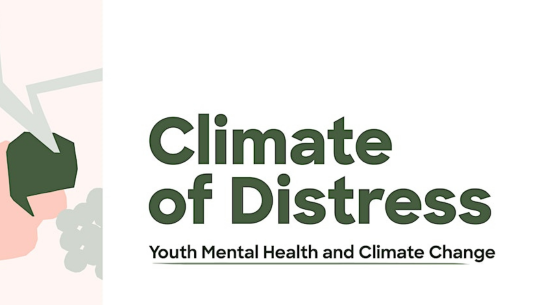.aspx?width=540&height=305&ext=.png)
Australia’s leading youth mental health think-tank, the Orygen Institute, is urging government, media and health and education leaders to consider a series of practical recommendations in response to alarming new polling that lays bare the impact that climate distress is having on the mental health of young Australians.
- The new YouGov polling found that more than 3 in 4 young Australians are concerned about climate change
- Two-thirds of young Australians said climate concerns are having a negative impact on youth mental health. 56% report increased concerns the past year
- Government inaction was the most frequently identified factor impacting youth mental health (75%)
The polling, conducted by YouGov and commissioned by Orygen, shows that more than 3 in 4 (76 per cent) young people aged 16-25 are concerned about climate change. Thirty per cent said they are “very concerned”.
Two-thirds of young Australians (67%) said climate concerns are having a negative impact on youth mental health, with a particularly significant number of young females (74%) reporting a negative impact.
Most young Australians (56%) say they have become more concerned about climate change in the past 12 months and only six per cent of young people surveyed said they were not concerned at all.
“These results show that climate distress is having a significant and escalating impact on the mental health of young Australians,” said Nick Fava, Senior Policy Analyst at Orygen.
“Recent surveys indicate the mental health of young Australians is deteriorating, and this polling shows that any policy attempts to reverse that deterioration must address climate distress.”
In response to the escalating impact of climate distress, the Orygen Institute has launched a major policy paper featuring 12 key recommendations for action.
Titled Climate of Distress: Responding to the youth mental health impacts of climate change, recommendations in the paper include:
- Fund the development of a youth-specific climate distress online hub
- Design and pilot a brief intervention for young people experiencing climate distress
- Develop media guidelines
- Establish and resource climate change youth advisory groups in states and territories
- Ensure the effective development and implementation of the National Health and Climate Strategy
The paper also calls for the development of a standardised definition and conceptualisation of “climate distress”, because the wide array of definitions used to describe climate-related impacts on mental health – for example, climate anxiety and eco-anxiety – is a barrier to collating the available evidence and drawing clear conclusions.
“While further research is needed to understand the effectiveness of climate distress interventions, these actionable recommendations can offer young people much-needed support in the short-term,” Fava said.
“Climate distress interventions should not aim to reduce climate concern, which is a valid response to a real threat, but aim to mitigate high levels of distress and significant impacts to young people’s wellbeing and functioning.”
LINKS